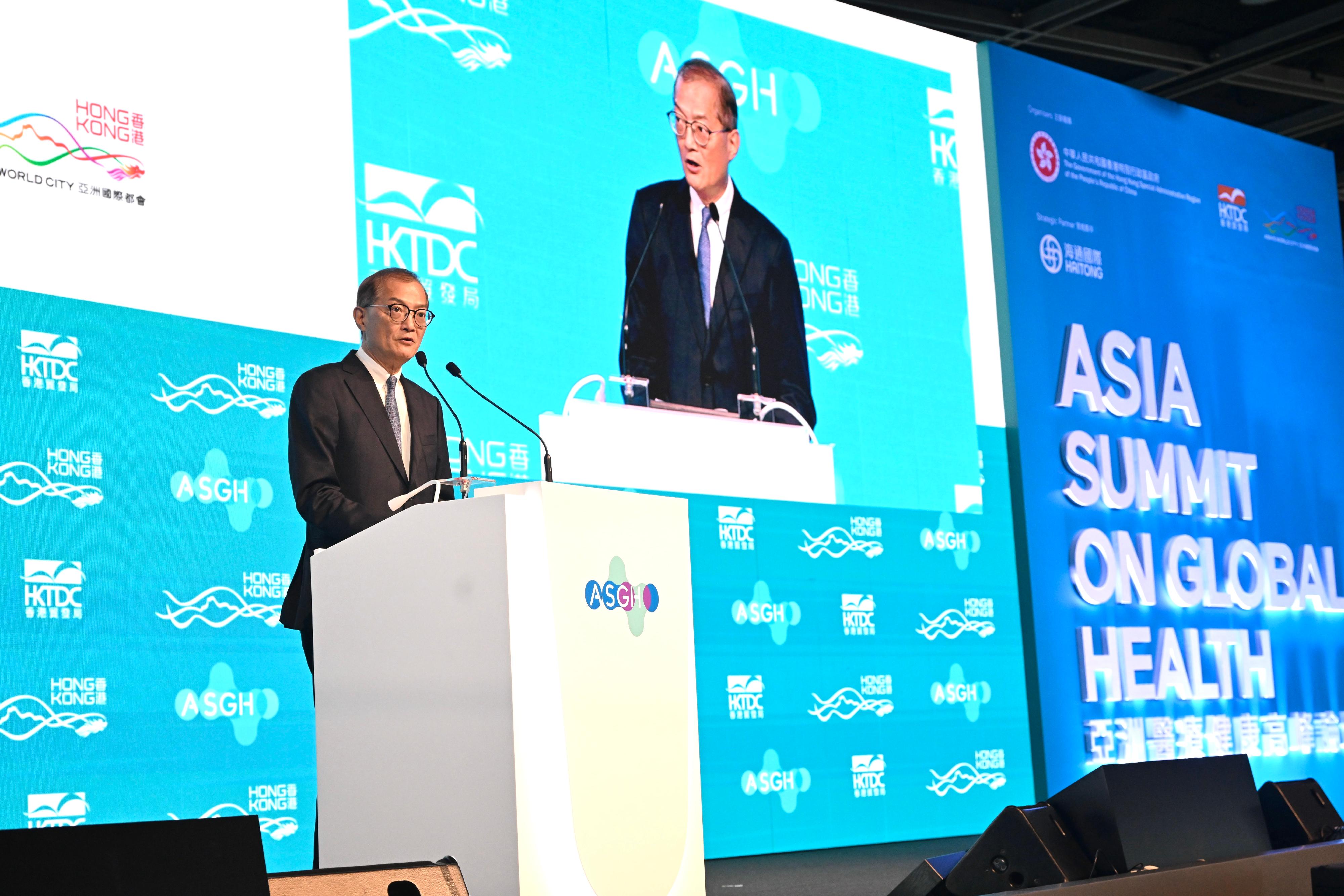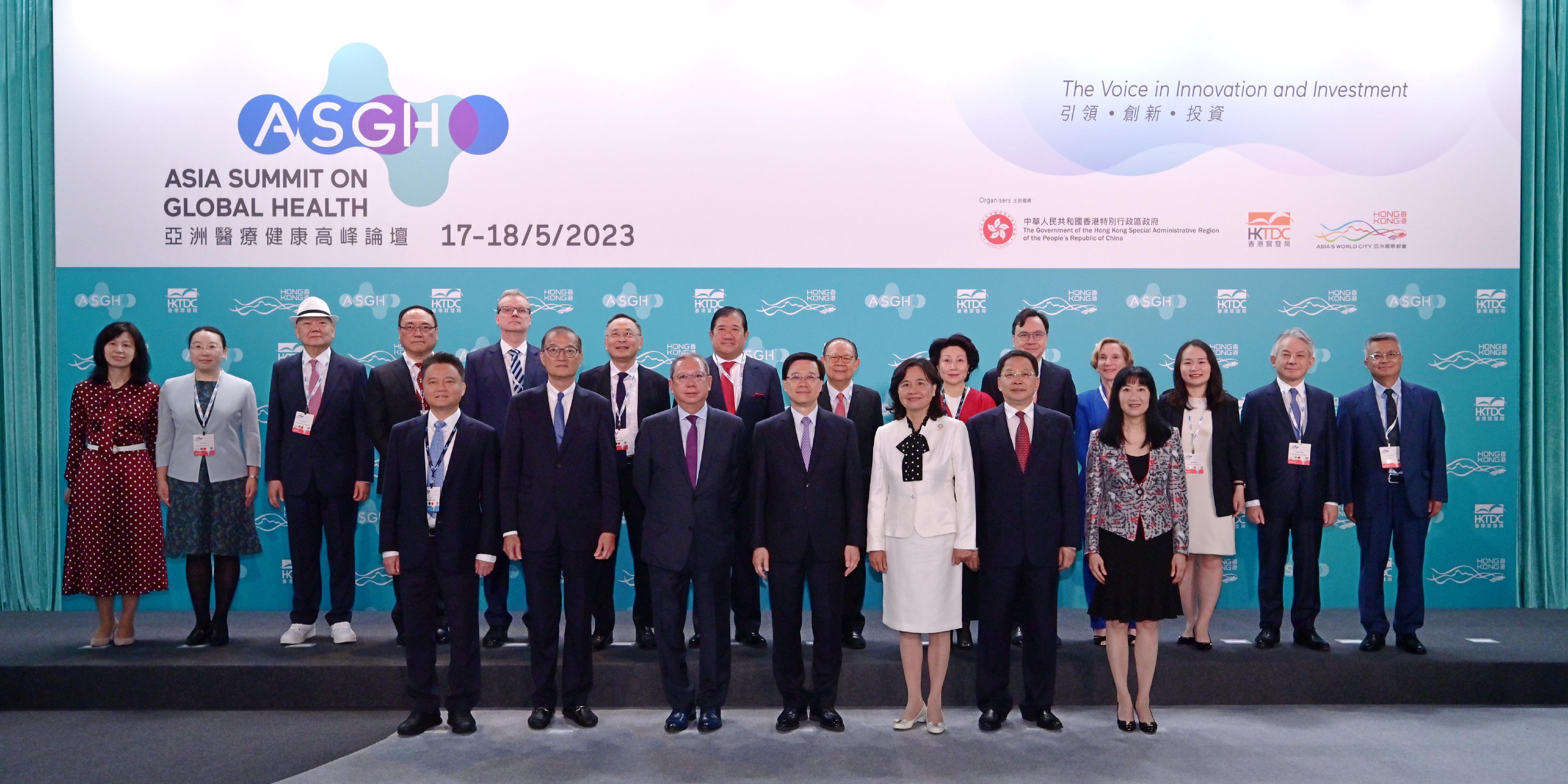Speech by Secretary for Health at Plenary Session: Reimagining the Future of Healthcare of Asia Summit on Global Health (English only) (with photos)
******************************************************************************************
Distinguished guests, ladies and gentlemen,
Good morning. It is a pleasure for me to welcome you again to this Asia Summit on Global Health. After the past three years of extraordinary challenges with the COVID-19 epidemic, I am so glad that we can get together and meet each other face-to-face in this Summit today.
As our society recovers from the COVID-19 epidemic, today's plenary discussion on "Reimagining the Future of Healthcare" offers a very timely opportunity for us to look into the future. As a Principal Official of the HKSAR (Hong Kong Special Administrative Region) Government, I would go the extra mile to talk about reshaping the future of healthcare in Hong Kong. Our goal is always a more resilient and sustainable healthcare system. Today, I would like to show you that we do not just talk the talk, but we actually walk the walk.
For decades, thanks to the concerted efforts of our professionals, as well as our citizens, Hong Kong has enjoyed very high-quality healthcare services. The data speaks for itself: our life expectancy in Hong Kong is one of the highest in the world. We have the best longevity, and our infant mortality is among the lowest. However, there is no room for complacency when it comes to healthcare improvement. Like many other advanced economies, Hong Kong is facing the challenges brought about by an ageing population, shortage of healthcare manpower as well as an increasing prevalence of chronic diseases. As the Chinese saying「逆水行舟,不进则退」goes, our quest for healthcare excellence is like rowing a boat upstream. If you do not keep up, you will fall behind.
From stability to prosperity
I trust you will agree with me that the past few years have not been the easiest time for Hong Kong. Fortunately, with the enormous support from our Central Government as well as the concerted efforts of our society, Hong Kong has achieved a major transition from chaos to stability. We are now in the crucial stage of transition from stability to prosperity. Under the National 14th Five-Year Plan and the Outline Development Plan for the Guangdong-Hong Kong-Macao Greater Bay Area (GBA), there are unlimited opportunities for Hong Kong and our citizens to flourish and fly. When reshaping our healthcare future, we will not be bound by the physical boundary of Hong Kong but will aspire and map regionally into the GBA context and contribute to the building of "Healthy China". I will now share with you what we are and will be doing to turn re-imagination into action under six areas.
Primary healthcare
The first area of action is in primary healthcare. As I mentioned earlier, many advanced economies like Hong Kong are facing the challenges of an ageing population, shortage of healthcare personnel as well as the burden of chronic diseases. In the face of these challenges, the HKSAR Government is determined to launch a major structural reform which aims to shift our healthcare focus from treatment-oriented to prevention-focused, from hospital-based to community-based. To achieve this goal, we launched the Primary Healthcare Blueprint last December.
In this regard, we have now set up District Health Centres (DHCs) or DHC Expresses in all 18 districts of Hong Kong, serving as the healthcare hubs in the community. We are promoting the concept of "Family Doctor for All". We will also launch a new Chronic Disease Co-Care Pilot Scheme to incentivise citizens to take part in early detection and treatment of chronic diseases. At the institutional level, we will establish a new Primary Healthcare Commission to act as the co-ordinating body.
Hospital Authority
The second area of action will be with the Hospital Authority (HA). Enhancement of public hospital services will certainly be a strategic part of our healthcare future. In 2023-24, the HKSAR Government has provided a total of HK$89.2 billion in recurrent subvention to the HA. To enhance its services on various fronts, the HA will:
(a) reduce the waiting time for specialist out-patient services;
(b) improve patients' experience by making wider use of telehealth services, introducing a new medication delivery system;
(c) enhance the efficiency of the management as well as services by developing "Smart Hospital";
(d) enhance specialist healthcare services by establishing the Integrated Neuroscience Centres, Cardiovascular Diseases Centres, Uncommon Disorders Registry and Poison Control Centre; and
(e) strengthen our hospital infrastructure by pressing ahead with the two Ten-year Hospital Development Plans with a total budget of HK$470 billion.
Healthcare manpower
The third area of action is in our healthcare manpower. To ensure sufficient healthcare manpower for Hong Kong in the years to come, we will look into every option from retention and training locally to recruitment internationally. The Government has substantially increased the number of healthcare-related training places in our universities. For example, the number of medical student intake has increased from 250 in the 2008/09 academic year to 590 in this academic year in the two medical schools. We have earmarked HK$30 billion to enhance the teaching facilities in these universities. After making legislative amendments to facilitate the special registration of doctors in 2021, we are now looking at amending the relevant laws to facilitate the admission of qualified non-locally trained dentists as well as nurses.
Chinese medicine
For our area of action in Chinese medicine, Hong Kong has a long-standing tradition of using both Chinese and Western medicine. As we reshape our future of healthcare, it will be a loss if we do not continue to promote this dual approach and make use of the unique benefits of Chinese medicine to provide patients with a comprehensive and personalised approach to healthcare. We are actively promoting the high-quality development of Chinese medicine in Hong Kong on different fronts, including the integration of Chinese medicine practitioners into our healthcare system. We will deepen the collaboration in Chinese medicine between Hong Kong and the Mainland under the GBA Chinese medicine development plan (Construction Plan for the Chinese Medicine Highlands in the GBA (2020-2025)). Hong Kong is also earnestly looking forward to the commissioning of the two flagship projects of our new Chinese Medicine Hospital as well as Government Chinese Medicines Testing Institute in 2025.
eHealth
In the area of eHealth, it is increasingly acting as a nexus in ensuring the sustainability of future healthcare systems and in fuelling the growing vision for patient empowerment. With the goal of "one patient, one health record" in mind, we will build an eHealth ecosystem which will put our patients at the centre. We introduced the Electronic Health Record Sharing System, or the eHRSS, in 2016 to enable two-way sharing of patient health data between the private and public healthcare providers. With a view to fully harnessing the opportunities offered by technologies, helping citizens manage their personal health, and bolstering a co-ordinated primary healthcare system, we are now advancing the eHRSS to a new level, known as eHealth+. Under eHealth+, we will transform the eHRSS from a health record-sharing system into a comprehensive and integrated operating and information infrastructure, underpinning different tiers and sectors of the healthcare system on a city-wide level. We will also draw reference from the practical experience gained from the Special Support Scheme for Chronic Disease Patients of the HA Residing in Guangdong Province (Special Support Scheme) and actively pursue the future implementation of cross-boundary use of electronic medical records.
Greater Bay Area
The last area of action which I will be mentioning is healthcare in the GBA. We aspire globally with our vision of establishing Hong Kong as a leading international healthcare innovation hub. We also act regionally with our commitment to improve healthcare standards in support of the national policies as well as lead the healthcare development in the GBA.
(a) Cross-boundary medical services
We are also looking at ways to make efficient use of medical resources across the boundary when the living circles of an increasing number of Hong Kong people straddle the boundary. There are over a million Hong Kong citizens living across the boundary in the GBA. We have established the Elderly Health Care Voucher (EHCV) Scheme and extended it from the University of Hong Kong-Shenzhen Hospital (HKU-SZH) to its Huawei Community Health Center (Huawei Li Zhi Yuan Community Health Service Center) in the Longgang District. We will continue to further extend this EHCV Scheme in the Mainland to other healthcare institutions in the GBA with similar healthcare service standards and clinical governance structures as the HKU-SZH. We will also study the feasibility of allowing Hong Kong citizens residing in the Mainland cities of the GBA to use the EHCV to reimburse the premiums of local medical insurance.
(b) International Hospital Quality Accreditation
We are working closely with our Mainland counterparts in the development and promotion of the International Hospital Quality Accreditation Standards, which have been compiled by the Shenzhen Hospital Accreditation Research Centre. In 2023-24, two HA hospitals will be accredited and adopt the Standards.
(c) Medical specialist training
For medical specialist training, the Hong Kong Academy of Medicine is collaborating with Shenzhen in setting up a specialist training system and provide training to trainers through its Shenzhen-Hong Kong Medical Specialist Training Centre. This collaboration will allow our Hong Kong Academy of Medicine to lead the grooming of the next generation of medical specialists in the GBA and increase the standards of healthcare services in the region.
(d) Healthcare innovation
Finally, in healthcare innovation, the Chief Executive has already mentioned that the National 14th Five-Year Plan supports Hong Kong's development into an international innovation and technology (I&T) hub. For life and health I&T, translation from bench to bedside requires technical trial data as well as an efficient and high-quality system for evaluation and approval. In order to make good use of the national policy of「港澳药械通」, or the special measure allowing Hong Kong‑registered drugs and medical devices to be used in the GBA, we will enhance our clinical trial platform and consider revising the current secondary evaluation approach for vetting and approval of registration of new drugs. Our goal is to lead high-quality and innovative healthcare development in the GBA and make Hong Kong the window of medical technologies, drugs and medical devices to complement the national strategies of bringing in and going global in life and health technologies.
In conclusion, in Hong Kong, we embrace the power of imagination and innovation to reshape a better future for our healthcare. We will continue to safeguard the health of our citizens, ensure high-quality healthcare services, as well as take a leading role in healthcare development in the GBA. We are building a "Healthy Hong Kong" to integrate into our national "Healthy China" strategy.
In closing, I would like to thank the Hong Kong Trade Development Council again for organising such a tremendous Summit in collaboration with the HKSAR Government. I wish you the most rewarding experience in this Summit and everyone good health. Thank you very much.
Ends/Wednesday, May 17, 2023
Issued at HKT 18:07
Issued at HKT 18:07
NNNN




